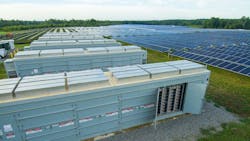Dominion Energy Begins Operations at 20 MW Dry Bridge Energy Storage Project in Virginia
Dominion Energy has announced its 20 MW / 80 MWh Dry Bridge Energy Storage project in Chesterfield County is now operational and providing power services to its customers in Virginia.
In addition to providing power to approximately 5,000 homes at peak output, the project’s additional services include the firming of intermittent, renewable energy, providing energy supply during peak demand periods by optimizing energy distribution, lowering consumer costs, and promoting economic growth.
East Point Energy, an energy storage projects development firm, sold the project to Dominion Energy Virginia in September of 2021 before its acquisition by Equinor.
Under the Virginia Clean Economy Act, 100% of Dominion’s electricity sales will come from clean energy sources by 2045.
“Dry Bridge, our first utility-scale, stand-alone energy storage facility, represents a significant milestone in our commitment to meeting our VCEA targets,” said Brandon Martin, Manager of Business Development at Dominion Energy. “Dispatchable resources such as this are critical to ensuring the reliability our customers expect.”
About the Author
EnergyTech Staff
Rod Walton is head of content for EnergyTech.com. He has spent 17 years covering the energy industry as a newspaper and trade journalist.
Walton formerly was energy writer and business editor at the Tulsa World. Later, he spent six years covering the electricity power sector for Pennwell and Clarion Events. He joined Endeavor and EnergyTech in November 2021.
He can be reached at [email protected].
EnergyTech is focused on the mission critical and large-scale energy users and their sustainability and resiliency goals. These include the commercial and industrial sectors, as well as the military, universities, data centers and microgrids.
Many large-scale energy users such as Fortune 500 companies, and mission-critical users such as military bases, universities, healthcare facilities, public safety and data centers, shifting their energy priorities to reach net-zero carbon goals within the coming decades. These include plans for renewable energy power purchase agreements, but also on-site resiliency projects such as microgrids, combined heat and power, rooftop solar, energy storage, digitalization and building efficiency upgrades.
